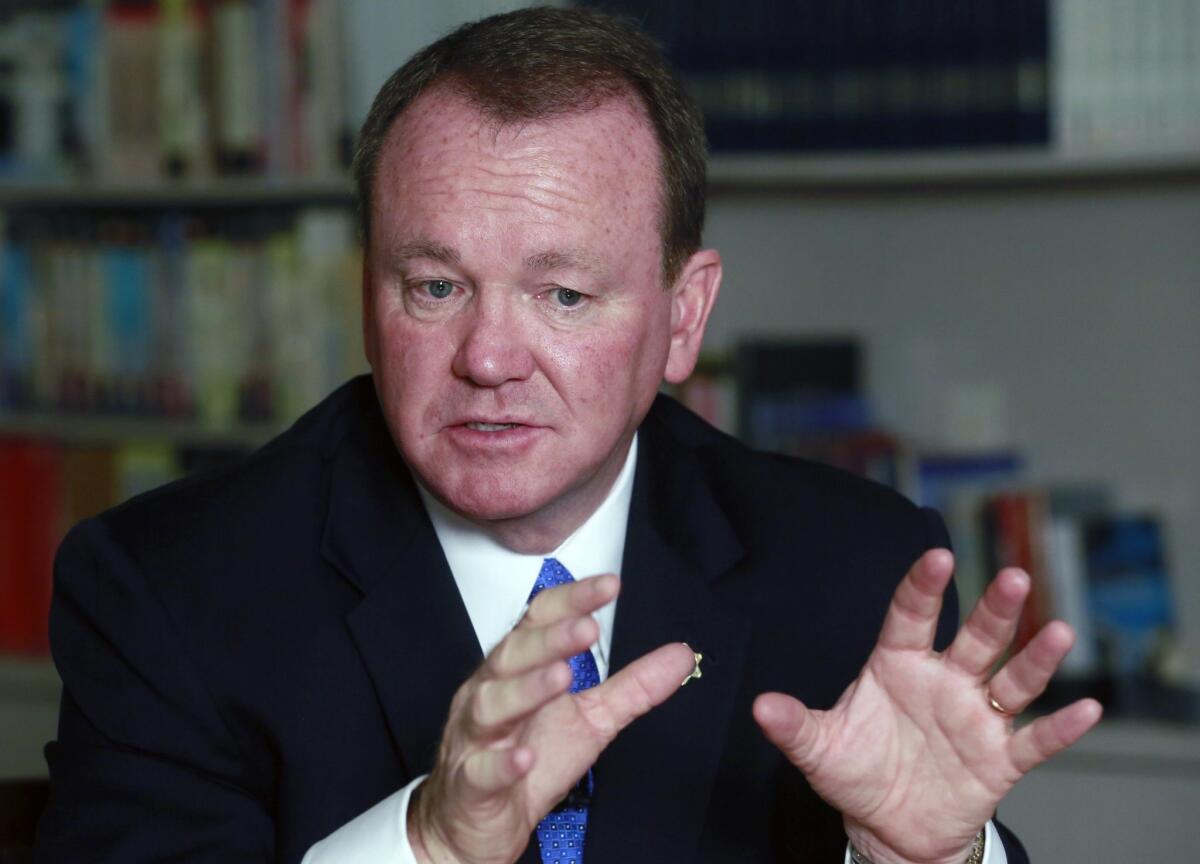L.A. County supervisors debate ways to structure sheriff’s oversight group

Los Angeles County Sheriff Jim McDonnell announced Wednesday that he has instructed his staff to stop arresting children on prostitution charges.
- Share via
Los Angeles County supervisors began Tuesday to publicly hash out how a new civilian commission overseeing the Sheriff’s Department should be structured and how the monitors should get access to confidential law enforcement records.
The board voted in December to create a civilian panel to monitor the department, which runs a massive county jail system and patrols the streets of unincorporated areas and 42 cities that contract with the county.
The agency has come under fire in recent years over allegations of widespread abuses in the jails that culminated with federal criminal charges against multiple deputies and former top officials, including retired Undersheriff Paul Tanaka.
A working group appointed by the supervisors spent six months hashing out recommendations on how to structure the new oversight body and what powers it should have. Now the board must decide how to move forward.
Jail reform advocates want the commission to have the authority to subpoena documents from the independently-elected sheriff. To give the oversight body that power would require a vote by county residents and a change in the county charter. The working group members voted 4-3 to recommend the supervisors move forward with a push for subpoena power.
Hernan Vera, a former public interest attorney and one of the working group members who voted to recommend pursuing subpoena power, said the oversight commission “would not enjoy the full trust and confidence of the public without that power,” and that authority is needed in case future sheriffs are unwilling to work with the commission.
“We have incredible respect for the [current] sheriff, but we wanted to set up this commission for the long term,” he said. “The commission, bottom line, would be dependent on the goodwill and generosity of the Sheriff’s Department to get the records that it needs.”
Sheriff Jim McDonnell, who was elected on a reform platform last November, supports creation of a civilian commission, but opposes giving it subpoena power. He wants the supervisors to hold off until his agency reaches a voluntary agreement with the board and Inspector General Max Huntsman on access to personnel files and records of internal department investigations.
Sheriff’s Department Executive Officer Neal Tyler, a working group member who voted against subpoena power, said McDonnell is hesitant to support it until he sees what the composition of the oversight commission will be and “whether they’ll be driven by statesmanship or a preconceived agenda.”
And Huntsman, who has complained that he is not getting the records he needs to investigate deputy shootings and other incidents, expressed skepticism that subpoena power would be the best way to get them because state laws protecting law enforcement officers’ privacy might still prevent some of the information from being released.
“The ultimate goal is access,” he said. “...Subpoena by itself does not get us access to the kind of detailed internal information that I think is absolutely critical in order to implement the goals of the board”
Mark-Anthony Johnson, an advocate with the group Dignity and Power Now, said the commission can’t rely on voluntary cooperation by the sheriff. Former Sheriff Lee Baca “touted himself as a cooperative sheriff,” he said, and the department’s cooperation with previous oversight bodies didn’t prevent the problems in the jails.
“Relying just on the [voluntary agreement] is not going to gain the trust of the community,” Johnson said.
No clear consensus has emerged among the supervisors yet on the question of subpoena power, or on other sticky issues, including how the commission members should be appointed and whether former sheriff’s officials should be barred from serving.
The working group voted to recommend such a ban. The group also recommended that the commission be made up of nine members, with one appointed by each of the five supervisors and four by a majority vote of the supervisors.
Supervisor Mark Ridley-Thomas, a longtime proponent of civilian oversight, said the board will decide the issues in “a deliberative process.”
“There is nothing wrong with a healthy discussion and debate around the issues at hand,” he said.
Supervisor Hilda Solis, who also voted for civilian oversight, said in a statement that she has “not yet made a decision on these issues, though I will say that I give great weight to the workgroup’s recommendations. I look forward to working with all stakeholders over the coming weeks to resolve these outstanding issues and launch this commission as soon as possible.”
But Supervisor Sheila Kuehl, the third board member who voted in favor of launching a commission, echoed Huntsman’s concerns that using subpoena power could simply lead to a series of court battles over which records should be released.
The other two supervisors, Don Knabe and Michael D. Antonovich, who voted against creation of a civilian oversight body, raised concerns about the composition of the commission, including the proposed ban on former sheriff’s officials and the possibility that county residents who are in the country illegally would be allowed to serve.
The board has not laid out a timeline for resolving those issues and taking a final vote to set up the commission. In the meantime, Huntsman and the sheriff are still negotiating a voluntary agreement for access to records.
Follow Abby Sewell on Twitter at @sewella for more county news.
More to Read
Sign up for Essential California
The most important California stories and recommendations in your inbox every morning.
You may occasionally receive promotional content from the Los Angeles Times.











